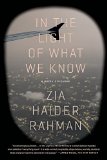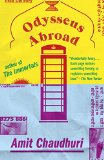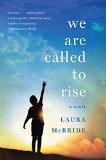Summary | Excerpt | Reviews | Beyond the book | Read-Alikes | Genres & Themes | Author Bio

A bold, epic debut novel set during the war and financial crisis that defined the beginning of our century.
One September morning in 2008, an investment banker approaching forty, his career in collapse and his marriage unraveling, receives a surprise visitor at his West London townhouse. In the disheveled figure of a South Asian male carrying a backpack, the banker recognizes a long-lost friend, a mathematics prodigy who disappeared years earlier under mysterious circumstances. The friend has resurfaced to make a confession of unsettling power.
In the Light of What We Know takes us on a journey of exhilarating scope - from Kabul to London, New York, Islamabad, Oxford, and Princeton - and explores the great questions of love, belonging, science, and war. It is an age-old story: the friendship of two men and the betrayal of one by the other. The visitor, a man desperate to climb clear of his wrong beginnings, seeks atonement; and the narrator sets out to tell his friend's story but finds himself at the limits of what he can know about the world - and, ultimately, himself. Set against the breaking of nations and beneath the clouds of economic crisis, this surprisingly tender novel chronicles the lives of people carrying unshakable legacies of class and culture as they struggle to tame their futures. In an extraordinary feat of imagination, Zia Haider Rahman has telescoped the great upheavals of our young century into a novel of rare intimacy and power.
Debut novelist Zia Haider Rahman is a true polymath and the novel showcases his ample talent effectively. It tells both Zafar and the narrator’s stories, eventually focusing on Zafar alone. But as Zafar ruminates about an endless series of topics - from salamanders to Poggendorff’s illusion, to why flags sometimes fly at half-mast and more, one begins to wonder whether Rahman is trying a little too hard to make this a dazzling debut...continued
Full Review
(917 words)
This review is available to non-members for a limited time. For full access,
become a member today.
(Reviewed by Poornima Apte).
"In the mess of Central Asia there are as many sides as there are opportunities to steal a march," Rahman writes in In The Light of What We Know. "There are no sides to tell us who is doing what, for whom, and why, only exigencies, strategies, short-term objectives, at the level of governments, regions, clans, families, and individuals: fractals of interests, overlapping here, mutually exclusive there, and sometimes coinciding." A 2013 New York Times article put the number of non-governmental organizations registered as working in Afghanistan at 2,320 employing around 90,000 people.
 The central organization in the novel is called AfDARI, the Afghan Development, Aid, and Reconstruction Institute. This bears many similarities to The ...
The central organization in the novel is called AfDARI, the Afghan Development, Aid, and Reconstruction Institute. This bears many similarities to The ...
This "beyond the book" feature is available to non-members for a limited time. Join today for full access.

If you liked In the Light of What We Know, try these:

by Amit Chaudhuri
Published 2016
A beguiling new novel, at once wistful and ribald, about a day in the life of two Indian men in London, each coping in his own way with alienation, solitariness, and the very art of living.

by Laura McBride
Published 2015
Three lives are bound together by a split-second mistake, and a child's fate hangs in the balance.
What happens next will test—and restore—your faith in humanity.
Harvard is the storehouse of knowledge because the freshmen bring so much in and the graduates take so little out.
Click Here to find out who said this, as well as discovering other famous literary quotes!